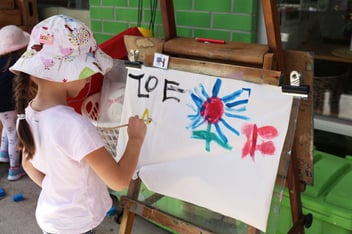Last month, Play Australia released A Risky Play Position Statement for Young Australian Children. It’s a welcome, well-evidenced affirmation of something deeply embedded in ECMS practice: that “risky play” is not just okay, it’s essential.
Risky play is defined in the statement as “play that is exploratory and challenging with often unpredictable outcomes. It is child-initiated and physically engages all the senses leading to positive learning and development outcomes” (Jones et al., 2025, p. 7). It involves things like climbing high, moving fast, playing rough, or venturing out of direct adult sight – experiences that offer just the right stretch for children to test their skills, courage, and imagination.
“Climbing a tree is risky, because sometimes I double flip off it. It helps you get stronger.” – Callum, age 4 (Jones et al., 2025, p. 8).
Children’s play can show us something that, as adults, we often forget - risk is not the enemy. Risk is where learning lives.
At an ECMS service, our educators believe that engaging in risky play is vital for children’s learning and development. Our teaching teams plan for and support opportunities for children to explore their environment and challenge themselves within play. Navigating risk promotes problem solving, persistence and resilience, and in a safe environment, is lots of fun!
Importantly, the Position Statement challenges the persistent myth that risky play is unsafe. Instead, it reframes risk in a benefit-risk context – one that acknowledges children’s capacity to assess, manage, and learn from uncertainty, especially when adults provide the right scaffolds.
This approach is powerfully aligned with the Early Years Learning Framework (EYLF) V2.0, which encourages educators to provide “well-planned and challenging outdoor environments that encourage risk-taking and risky play experiences” (Australian Government Department of Education, 2022, p. 47). It recognises that children develop key dispositions like resilience, self-regulation and agency when they are trusted to take supported risks in their learning environments.
ECMS Head of Pedagogy Emma Forsyth emphasises the importance of risky play in our goal to foster lifelong learning:
“At ECMS, we know that risky play helps children build critical life skills like decision-making, self-awareness, and emotional regulation. As teachers and educators, our role is not to eliminate risk, but to create environments where children can safely stretch their limits, test ideas, and construct their own identities within this exploration."
Emma’s words echo the Position Statement’s evidence-based conclusion: that engagement in risky play contributes to improved physical health, social confidence, and reduced risk of childhood anxiety by allowing children to practice responses to uncertainty (Jones et al., 2025, pp. 8–9). The benefits aren’t theoretical – they show up every day in our sandpits, trees, bikes, and bush kinder trails.
We see children negotiate a fallen log with a mix of trepidation and determination. We hear the squeals of excitement from children pushing wheelbarrows faster than ever before. And we watch as educators guide from beside, not in front, inviting children into decision-making, not rescuing them from it.
These moments are not incidental. They are pedagogical. They are purposeful.
They are grounded in our commitment to the ECMS pedagogical framework, which positions children as capable, competent and full of potential. Risky play supports children to enact that potential, and with the support of trusted adults, to make meaning from every jump, stumble, and climb.
Play Australia’s Position Statement provides strong evidence for what ECMS services already know and do. It’s not just about climbing higher, it’s about thinking deeper, feeling braver, and growing as a learner. And we think that’s worth the risk.
References
Australian Government Department of Education. (2022). Belonging, being & becoming: The Early Years Learning Framework for Australia (V2.0).
Jones, R. A., Little, H., Elliott, S., & Tonge, K. (2025). A risky play position statement for young Australian children. Play Australia.

.jpeg?width=352&name=bridge_road_kindergarten_right%20(2).jpeg)
%20cropped.jpg?width=352&name=21-03-24_ECM_LOWRES_@MAXROUX-4%20West%20Maddingley%200324%20(86)%20cropped.jpg)
